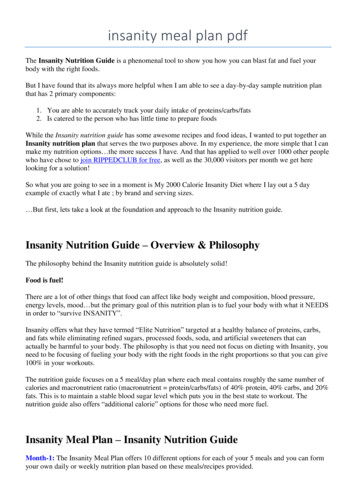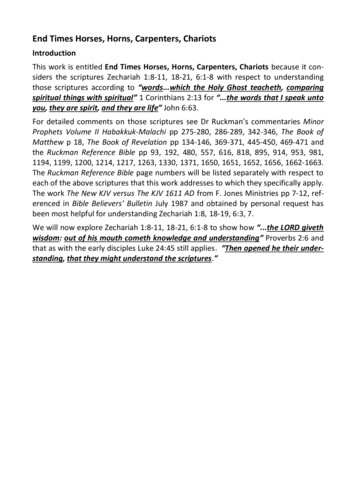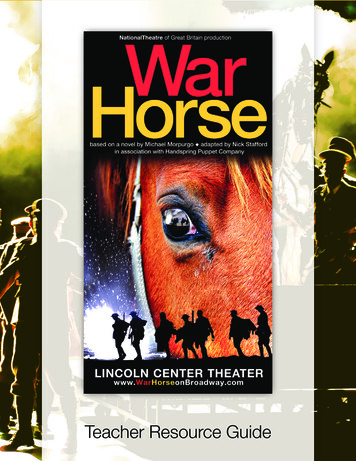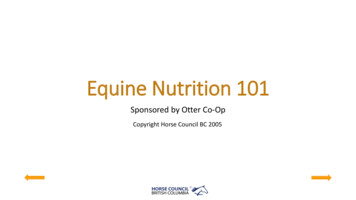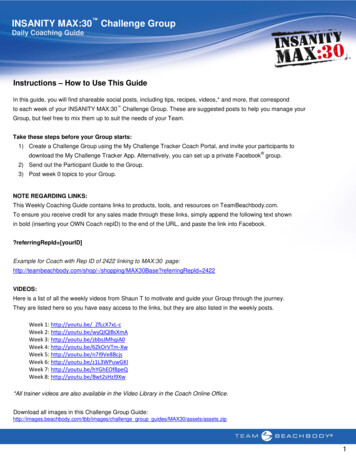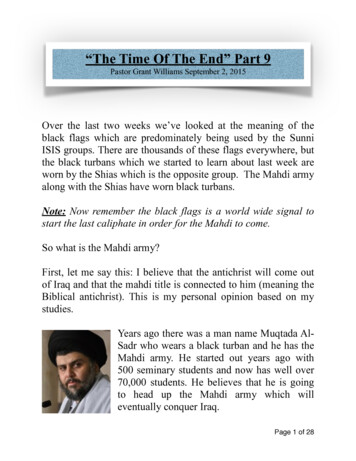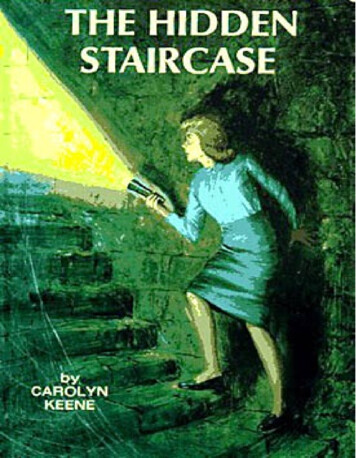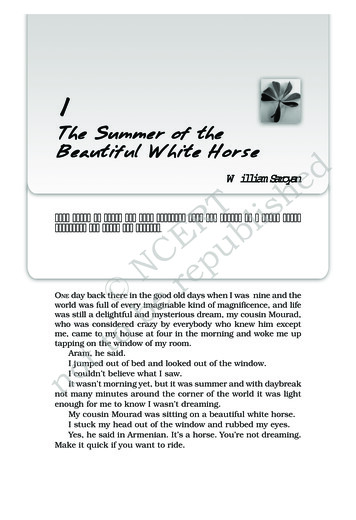
Transcription
Insanity’s HorseFALL 2008 ‐ SPRING 2009Insanity’s HorseDrew University’s Art and Literature Magazinecirca 1985
StaffLITERARY REVIEWERSEDITORS-IN-CHIEFCameron SmithSamantha PritchardAlexa TierneyAlshaimaa SalemKainat AbidiLAYOUT DIRECTORFACULTY ADVISORSCara SwanProfessor Tiphanie YaniqueProfessor Patrick PhillipsLITERARY EDITORAndy BenavidesSPECIAL THANKS TOCover Art by Alexis KoenigART EDITORandJames Felixall Drew students whosubmitted art and literatureThe text of this issue is set in Palatino Linotype.The magazine was designed in Microsoft Publisher 2007.
ContentsUnprimedLisa AppleUntitledCourtney RumboughLightning BugsDavid CrewsWhile Cooking Teriyaki SauceH. SudolCursiveJohn DabrowskiOneKristin GerminarioThe MessSeth GorensteinReflections in the Forest(oil on campus)Russell KirbyGalveston BaySteve CarnesCollage montageYu‐Hsuan ChenThe Nature of PeaceArvolyn HillWhen it’s cold outsideSteve CarnesoperationSheryl McCabeCraving BetterChristina AndreolaApartment No. 5Arvolyn HillBethlehem PrayerNicole ChampagneDisobedienceLisa AppleSnowfallKirstin BethavasSupercollider I & IIKristen HuggEpitaphStacie MacLaughlinThe SphinxJordan Stamper12333458910101112121313141920Outside this BodyJessica BrownSelf‐PortraitCara SwanMy Homies NorthKathleen Cole BurkeMourning TideJaya MisraConfession in DeckerHall Room 216AVictor AlcindorUntitled (figure)Katharine OvergaardThe King and IStacie MacLaughlinMystery of the MindJoanna GinderLa StregaDeborah NuberL’AOÛTClare MullaneyEulogyJordan StamperBostonCara SwanExiled GuardVictor AlcindorIntegrateH. SudolRubix 5 & Inside‐OutKristen HuggSunbathing in thePlaza San MartinSamantha PritchardFestivalKristen HuggTo my first love, Beth,in second gradeCharles ors’ NotesSamantha Pritchard & Alshaimaa Salem37
1UnprimedAfter Unprimed Canvas 1944‐N No. 2 by Clyfford StillThey used to sketch on cave walls,bump of rock forming the humpof a buffalo’s back. Slappingbloody handprints onto the stoneto celebrate a successful hunt.Centuries later, on church ceilings,so eager to create they’d paintover what was already there.The rust‐colored stain of hundredsof winters worth of water damagebecame an angel’s crown. A clotof paint in a corner became a spire on heaven’s castle.Now, people gravitatetowards only the primed canvasses,gliding past the rooms of shell mosaicsarranged on driftwood, not even glancingat the shovel suspended from the ceiling.But in one corner of the roomhangs an unprimed canvas. Deep, splotchy greenit challenges, who declared our surfacemust be smooth even as our souls are cracked?People stand and stare at the sterile and brightseascape next to it as all the while it dares you to look,whispering, who sayswe cannot lovewhat is raw?Lisa Apple
2UntitledCourtney Rumboughwire, nylon, acrylic, oak branch
3While Cooking Teriyaki SauceBefore the alcohol had boiled away,I’d tasted you.Lightning BugsLightning bugs risefrom twilight grasslike little fireworks.You’d burned my tongue: it waspunishment for my wanting to taste youbefore you were ready.In that burn, you’d told meto be patient, to be slow.You will let me taste youwhen you are ready—I must learn to wait.There’s a reasonAre you ready yet?for their light—H. Sudolthe rhythmsattract matescursivethe way we toosend out subtlea style of printed lettersignals of love.leeches out of the increasingHow oftencreases of your blue thumbs,we flutter throughrubbing together to paint anotherthe cool nightvan gogh to room in wiry neuronsonly to be trappedcluttering that blonde head.in the glass graspi can almost decipher yourof a twelve year‐penmanship drawn from spider elbowsold’s imagination.and skinned knees. they weave aroundWe pace the clear wallsthe maroon comforter, rocketing to thesaying to ourselvesstreet sounds escaping the skyscrapers’we must gosteel tongues. green light dasheswe must go.David Crewswe must goyour tired pupils, then kissingthe cursive of your chest, dottingthe i’s as it turns red. i latchmyself to the inky corner of the sunkenmattress, as you snore dreams,resembling handwriting.John Dabrowski
4OneKristin Germinariopencil
5The MessJanine stood in front of the Campbell’s soup display, her bony arms bent and handsgripped to the waist of her frail frame. Her eyes swept over each disheveled row of soup cans asquickly as the beep of her bar code scanner. Janine drew a short sigh. The task before her wasnothing monumental, but it wouldn’t be as simple as restocking the peppermint Altoids by thefront register nor as pleasant as displaying Sunday’s flowers. But it had to be done. The sparsedisplay case mocked her, its red‐white consistency now checkered with the black gaps of sold‐outsoup varieties. This would not stand.Janine sat on the mustard‐colored tiles of her dull linoleum floor. She scooched forwardand straddled her legs around the cardboard box of new Campbell’s cans. Because she had mis‐placed her X‐Acto knife, Janine would have to pry open the box with brute force. It was unfortu‐nate—though not surprising—that Jorge, a passive aggressive alcoholic and her only employee,had called in sick this Saturday morning. At least his oafish arms could have opened this silly box.Janine wrestled with the tape. She blurted a soft giggle at the thought of a customer dis‐covering this compromising image of her valiant struggle. But it was barely 10 a.m., and Janineknew that no one shopped Janine’s Convenience Emporium before noon. She couldn’t figure outwhy—perhaps because the afternoon was a more convenient time for her customers to shop fordry goods, canned food products and cleaning supplies. Or perhaps “emporium” was an ornatedescription for her hole‐in‐the‐wall convenience store. Maybe her customers didn’t know what“emporium” meant.Tucking a strand of her charcoal hair behind her thick‐framed glasses, Janine closed hereyes and, exerting her final quantum of energy, ripped the box open with a satisfying snap. Janinelet out a triumphant sigh, and examined her spoils of victory. Shit, she thought. What should’vebeen a variety of Campbell’s condensed soup was instead dozens of cans of Campbell’s DisneyPrincess Cool Shaped Pasta in Chicken Broth. Janine held up a can. Three WASP‐y looking Disneydamsels‐in‐distress stared back at her. These were carefully marketed cartoon interlopers defam‐ing the Campbell’s iconography. Janine shuddered. She stood and began beautifying the displaycase, first by reaching into the dark, dusty back of the shelf to extract forgotten green pea, chickennoodle and consommé Campbell’s, and then restocking the shelves with Disney Princess pastamakeover cans.When the cardboard box was finally empty, Janine scratched under her bandana andstepped back to admire her craftsmanship. Harmony had returned: Before her stood a wall of per‐fectly positioned, impeccably placed, and chromatically synchronized soup cans. The SnowWhites and Ariels gazed ahead lifelessly. Janine cradled a back‐shelf can of cream of mushroomsoup; how she loved cream of mushroom soup. So simple, yet so sweet, thick, and perfect. Janineenvisioned herself hours from now, locking up shop and hurrying through the barren nightscapetoward her decaying apartment. Her travels would lead her past the usual sights and sounds—thepretty faces talking about nothing outside the Axiom night club, the pulsating techno rhythmshaking the asphalt by Charlie T’s Gentleman’s Lounge. Passing by people living wildly but with‐out passion, Janine would walk with the determination of a drill sergeant.It would be only Janine treading the sidewalk. Only Janine would unfasten the rustydeadbolt of her apartment’s door, and only she would sit by the glow of the microwave as a bowlof Campbell’s soup bubbled and warmed. And after eating quietly and politely, Janine would curlinto her battered futon and wait for sleep to take her away.Ding‐Ding. The call of the front door bell called Janine back to the present. She lookedpast the meticulously stocked shelves to see Jerry, the neighborhood deviant and her most fre‐quent customer, stumble into the store. Janine raced to the front register to protect its contents andsurrounding impulse items like a lioness to her young.“Hey, hey, my little darling Tinkerbelle,” Jerry slurred as he looked over Janine. His eyes
were bloodshot, and his doughy face unshaven. He placed himself in front of the counter, and 6started fingering the display of candies and gum. His sweat‐stained shirt barely covered hispotbelly. That Janine’s heartbeat quickened upon seeing a line of hair circling Jerry’s exposedbelly button made her excited and ashamed.“Hello, Jerry,” she sighed. “What are you looking for this morning?”Jerry snorted and shook his head, his eyes looking at nothing and everything belowJanine’s neckline. “Same shit I look for everyday,” he murmured. He looked up and smiled a yel‐lowed grin: “Some six packs and potato chips.” His breath smelt like beer and armpit. With asmack of the counter and a guffaw, Jerry lurched down aisle two.Janine concentrated on picking a speck of gunk off the counter. She was reluctant to see ifJerry was disfiguring the straight rows of food goods she had spent all morning perfecting. Thefront door bell rang again, and a blur of two adolescent boys chasing one another raced pastJanine. She stood dumbfounded. Why was her emporium so busy so early in the morning?Jerry came bounding toward Janine with his hairy arms around a medley of beer cases,potato chips and cheese dip. He unloaded his bounty onto the counter. Behind Jerry, Janine couldsee the two boys darting and weaving between her aisles. Their screams ricocheted of the coffeecans and cereal boxes. This could prove disastrous very quickly.“Hey, later on, I’ll be watching the game at my apartment with some guys, you know?”Jerry said. He slid a wrinkled twenty dollar bill across the counter. Janine ignored him, becauseher eyes were locked on the noisy chaos in the back of the store. She automatically began to scanhis items without saying a word.“Hey, hey,” Jerry said. “I was thinking that a nice lady such as yourself could come andparty with me—us.”Janine looked past Jerry and raised her hand. “Hey, guys?” she said, raising her voice.“You, you might knock something over. Could you please settle down?”Nobody heard her. One boy leapt onto the other, and both fell onto the dull linoleumfloor. Jerry grunted, and leaned over the counter, his flap of belly fat resting by the YMCA coin jarand Chapstick box. “Listen, Janice, I think you are really something,” he breathed. “I may haveseen too many days, too many nights, but, you know you should come to my apartment. We’dhave a good time.”His words fell on deaf ears. To her horror, Janine watched as one boy jumped up off thefloor and swiped a can of Campbell’s soup from her display. Without hesitation, the boy threw itat his companion. The shot missed, but the target darted forward and launched his body weightinto the other boy. The two ferocious creatures flew back into the Campbell’s display, and it allcame down in a waterfall of tin.Janine’s toil and meticulous attention rolled about in scattered ruin. What was a wall ofcomforting conformity had crumbled into disarray. The minutes spent placing and twisting thecans to display the hideous yet perfect Disney women were wasted by an instant of indiscretion.And it was all caused by two Tanzanian devil‐children. Two boys. It’s always boys.Janine all but leapt over the counter and raced to the scene, gently side‐stepping runawaycans as she approached the perpetrators. Behind her was the snarling and dry laughter of Jerry,who took the situation for high brow comedy. Janine ignored him. She approached one boy whowas rolling in pain. She reached down to touch him—she didn’t know why—and he leapt to hisfeet like a frightened animal. For an instant, his blood‐stained eyes, wet with tears, made contactwith Janine’s. But in a flash the boy had darted around Janine, past Jerry and through the exit.Janine felt robbed, her dignity dashed, but she turned her attention to the other boy, who was ten‐derly holding his leg.Every article of clothing on the boy was too big for his body. His shaggy jeans engulfedhis shoes, his baggy t‐shirt swallowed his scrawny frame, and his black New York Yankees base‐ball cap, worn backwards, must’ve been stolen from the drawer of an older brother. As the boywrithed in pain, his wallet chain crackled on the dull linoleum floor.
7Janine stood over the boy, and couldn’t decide to scold or help him. “Hey,” she said, butthe word stuck in her throat. “Hey,” she said louder. “Are you alright?”A protracted wheeze escaped the boy’s throat. “Fuck no!” He yelled. “I just crashed intothat thing of cans!”Janine was slapped by the ferocity of his words. Jerry, making the scene into a spectatorsport, had open his recently purchased bag of chips and munched happily. Bits of chip fell to thefloor as he laughed at the unexpected expletive. Janine shot her attention toward Jerry, who hadno business in this affair. Jerry wasn’t quick on the uptake, but he could read the eyes of a scornedwoman. He gathered his things, nodded once, and lurched into the morning sunlight.The boy stood up. He gingerly walked past Janine, kicking soup cans that lay in his way.She stood flabbergasted, as if all her joints were marred with molasses. As the boy drew nearerand nearer to the door, and the permanence of this gross injustice loomed larger and larger, Janinefinally mustered the strength to raise her voice.“Hey, stop!” The boy turned. “You, you can’t just leave,” she said, her bony arms raised.“Please help me clean this up, young man.”The boy smirked and rolled his eyes. “Why should I clean your shit up?”Janine cocked her head at the question. It was as if she clawed and scratched for everyword. “You you can’t just go, not after what you did this is my store, this is my store, andyou no you just can’t. Help me clean this up.”“Fuck off, lady,” the boy snorted. He turned. He started to walk. Snap. Somethingsnapped. The speed with which Janine raced through aisle two caught the boy off guard. Janinepushed off the boy’s shoulder, and placed herself between him and the exit. By doing so, she trig‐gered the motion sensor of the automated door. It swung wide open, and behind Janine was a dis‐orderly world of cars driven by faceless drivers, pedestrians walking and thinking only aboutthemselves, and boys masquerading as men.“What—get the hell out of my way! Let me out there!” the boy said, pointing toward hisfreedom. The morning sunlight illuminated Janine’s silhouette, and she stood confidently, herhands gripped firmly to the waist of her frail frame.“No. You are not leaving my store until you clean up the goddamn Campbell’s soup,”Janine said. Nothing could break her fiery stare. The boy looked left, right, started to speak,caught himself, looked to the ground, looked to the ceiling, and then picked his cell phone out ofhis pocket.“I’m calling my mom,” he said. Beep beep beep. Janine crossed her arms.“Hey, ma?” the boy said into his black cell phone. “Ma, listen, there’s this crazy bitchwho’s keeping me in her store. Yeah, it’s like she kidnapped me! I didn’t do shit! I don’t knowwhat to do.”The boy glanced up at Janine, and she gazed down on him. She didn’t notice him termi‐nate the call with the press of his thumb.“No ma, I’ll tell you what I’ll do.” He said into the phone as he looked Janine in the eye.“I’m gonna tell this lonely, pathetic piece of crap to move the hell out of my way, cause I heardabout this broad from Johnny. I heard she creeps around this store late at night, all alone, causeshe’s got nothing in her life. So she stays inside, and plays with her soup cans. This place is a gar‐bage dump, just like this broad I’m staring at right now.”Janine didn’t blink. She didn’t breathe. The boy’s raw hatred stung her like the sharppierce of a subzero chill—a sensation all too familiar. It was the same cold that enveloped Janinein her father’s house while growing up, and it was the same frigidity that awaited her return toher grimy and lonely apartment. The difference was that the boy now said what all the other menmust’ve thought.A warm tear trickled down her soft cheek. And then another. Janine gripped the greasyhandicap rail to her left, and the tears formed irregular dots around her, darker than the black
8tarp where she now sat. And then her head buckled, and the sobs came. She cried notjust for herself, but for him, and for him, and now for this boy.His gait relaxed, and his lip began to quiver. The boy now saw the outside world un‐guarded, but he remained. Looking upward at the boy from the floor, Janine thought he seemedtaller than his 12‐years could endow. His shadowy frame, battered in the light streaming throughthe dirtied window, was like a prophetic glimpse of the body he’d grow into. With a small stepforward, the figure lowered his face to Janine’s. Now she saw him with greater clarity. His cheekswere rosy red, and pimply too. He was still just a boy. He gently touched Janine’s shoulder withhis sweaty palms and almost started to brush back her hair.“I’m sorry,” he whispered. And with that, he ran outside. The automatic door waited amoment, and then shut out the manic world. Janine rubbed her wet eyes and peeked at the messof soup cans. Perhaps, on her own, it wouldn’t take as long to clean up as she had thought.Seth GorensteinReflections in the Forest(oil on campus)Russell KirbyDigital Photography
9Galveston BayThe anticipation of a crashing wave—the unstoppable force,brings a certain sense of tensionfor a day at the beach.The excitement hasn’t been herefor a while now, and I wonder;Where are the people?A grey blanket of cloudcovers the sky. I turn aroundto see my grandmotheris much further away than I thought.If it wasn’t for her magnificent flowered shirt,and the stars of jewelry on her fingers, ears,and neckI would not have seen her, and felt alone.She is in her chair on the beach,and water is rolling against my hips.She said something to me—something I heard beforeabout fishing or that she lovedmy hair, and I smiled and wavedas a grandson would do.Aren’t you proud of me?A wave rose, swallowing a school of fish.I saw them gliding within the warm salted swell.It gave me hope, and for the first timethat morning, a smile stretched across my face.Like small rainbows they flutteredcreating a dancing light on the surfaceabove them. The whites of their bellies—buttery and speckled with black dotsmade my eyes hungry, and I wanted onefor my own.I reached back to cast out my line,but my arm was cast out instead.It traveled up past the rings of the rodunraveling and rising, reaching farover the curling wave and divinginto the warm ocean water just behind it.I grabbed one, pulled it out,and brought it in close my chest.It squirmed and wiggledas I had expected, but felt rather hardand smooth, like a polished stone—shining with a brilliance even greater thanbefore.I would have held that fish—my gem,for the rest of my life,if my grandmother hadn’t taken itand put it in her plastic bag.Its gills stuck to the white,like a Band‐Aid and it suffocated.What are you doing?The hardened grey fish came out—cramped and wide‐eyed. I knewit was dead, but only because I hadseen death once before—motionless.She said something I heard.“Watch me”And with the heal of her handshe drove a knife deep into the anusof the fish, until she hit its spine.Dragging the knife upwards, she splitthe belly open, grinding against the vertebrae,leaving the insides unsalvageable. She openedthe fishlike the un‐crusting of an eye lid and scoopedthe creamy black insides out with her index,and rejected them into the garbage.“Dinner” she said.Steve Carnes
10Collage, Yu-Hsuan Chen, photoshopThe Nature of PeaceI know but will not tell you,where my motherʹs bones lie.I listen for the sound of beauty,escaping the path taken by my youth.I find solitude in a tree,where caterpillars tickle my skin.Free from societyʹs trials I find where wisdom is whispered through wise winds.Branches bend and kiss my bones years after her deathbecoming the earth that was stripped from my ancestors.I form into a sapling.We find clarity through the stories told by our loved ones,sleeping below the roots.Arvolyn Hill
11When it’s cold outsideI think of you—when it’s cold outsideand time has frozen‐shut the eyesof my house with sheets of iceThe crystals, which have formedAre perfect, remaining stilloutside the windows where I cannot seeI am to live without eyelids insidebarely within reach of the warmthfrom the fire, which heats my house in winterWhy can’t I go outside?but silence, never respondswith answers, that please my heartI wish—I left with youthat night when it was coldand you walked to the universityDid the wind sting your cheeks?I bet it hurt to smile—and moveyour frozen fingers through the coldTell me all about the night, for I wishto pretend I was there—smoking cigarettesand drinking your bold brown liquorsBut here I sit silencedby the crackling warmth from the firewhere I no longer wish to beAnd hear the cold windsWhip—through the frozen treeswhen I think of youAnd the morning afterwhen they woke—and found youcold.Steve Carnes
12operationI felt the mentholated air rush crisp against my tonsilsand took in fake inhalationsuntil I was dragged into a sleep that mimicked sleepInanimate, I waded through hospital roomsbleeding through cotton sheet after cotton sheetand then blood hit the plastic coverThe tiny hands that lived inside minewere stolen while we still were connectedI woke up to a wake I never thought Iʹd attendI have no more heart to heartsbecause I thought losing would be easybut instead I got lost in my lossFor weeks, I carrieddeathitʹs pieces collected at the drain of my showerSheryl McCabeCraving BetterSitting on the edge of his seatHe pulls the lever incessantlyWaiting for the golden streamOf victory, but there is nothingBut the cocktail waitressAsking: ʺAnother scotch?ʺThe pulling of the lever pacesHeaving breaths, constantlyRecycling anticipationWith disappointment.He pulls the lever againAnd again at the end of the nightHis wallet is empty.Christina Andreola
13Apartment No. 5When I die it will be on Paris Street,Across from the bodega near 72nd.The heat will echo through my skin,Luring people to the blazing pavement.Near the park where children scream,And men play craps outside the liquor store.Where Hispanic music is blasted from boom boxes on windowsills.By the old Baptist church where,you can always hear the whispers of a hymn.As old women sit on porches forcing kinky hair into three braids.Two blocks down from where ten year olds,Choose between blue or red.Outside the house Uncle Jim sits on the steps,Waiting for his dream deferred.Upstairs from the ninety‐year‐old women counting rosary beads.In the room next to the kitchen the women in the red dress plays Al green,Bringing the smell of collard greens,Under the door into my room.It will linger there like a first kiss.I will die lying there listening to the sounds of my mother’s song.Here in my native.Arvolyn HillBethlehem PrayerNicole ChampagnePhotograph taken in Church of Nativity in the West Bank of Israel
Disobedience14Mr. Peterson liked the way the world streamed before his eyes when he rode in the car.He liked when his wife drove and he could place his left hand on her thigh and sing “Oh darling,oh darling” in unison with the oldies radio station, giving the flesh of her leg a firm squeeze tohelp him keep the beat when the singer on the radio paused for the musical interlude to pass be‐tween the 4th and 5th verses. So it was in that way that he and his wife drove three hours acrossPennsylvania and pulled into the long, winding driveway of Mr. and Mrs. Peterson’s oldestdaughter’s home in Chadds Ford.“Lots of leaves,” Mr. Peterson said, opening his door and stepping into fall.“Pardon?” Mrs. Peterson’s hearing, even at its best, never was what his had been.“Lots of leaves, Meryl,” Mr. Peterson repeated. They were scattered on the lawn, woventogether in a quilt of color. Tod, Kathy’s husband, never did make time to rake them so onThanksgiving it was always Mr. Peterson who would pull down a rake from its hook in the ga‐rage and form piles in the front yard. Sometimes the younger grandchildren would fling them‐selves into his piles or beg to be the ones to get lifted into the large brown bags the leaves gotplaced in and help stamp them down.“What? What did you say?”Mr. Peterson reached behind his wife’s ear like a magician about to produce a coin. Heturned up the dial of her hearing aid. “I said I love you.”“Oh good.” Mrs. Peterson looked up at Mr. Peterson and there was no part of her facethat didn’t believe he’d meant what he said. “Let’s go inside.”“Was the drive here okay?” Without waiting for an answer Kathy, Mr. Peterson’s oldestdaughter, was pulling off his coat, slipping the limp jacket onto a hanger. “Tod could have pickedyou up. He wouldn’t have minded.”“Your mother likes to drive.” Mr. Peterson watched through slats in the blinds as Todwalked Mrs. Peterson up the driveway, one hand on her back, guiding her closer to the door asher walker stuttered over the chunks of gravel on the driveway.“I know she does, but—”Tod opened the door and the foot of Mrs. Peterson’s walker passed the threshold. Shebanged straight into a chair, like she hadn’t even noticed it was sitting against the wall, and Kathygave Mr. Peterson a look which he hated. That o‐what‐I‐tell‐you” look and he knew she was right but didn’t want to do what she said. Though maybe hewould be the one to drive home, Mr. Peterson considered, as Mrs. Peterson knocked over the plas‐tic plant next to the arm of the deep brown loveseat she sank into. A small patch of lighter brownwas still visible on the back of the couch, the effect of stain remover being poured onto the spotwhere Kathy and Tod’s son Andrew had decided to finger paint one weekend three years ago.“Go kiss your mother hello,” Mr. Peterson said.“I will, Dad.”“And after dinner I’ll rake your leaves.”Mr. Peterson watched Kathy look towards Tod, who was straightening the picture frameson the table next to the couch. “You don’t have to do that.”“I rake your leaves every year.”“You’re our guest, is all I’m saying. You don’t have to do that.”“I’m your father, not a guest.”“I know, Dad.”“I like to rake leaves.”Kathy looked at Tod again, when she answered. “We’ll worry about it after dinner.Marge just called and said she and Bethany would be a little late, but Laura and the kids will behere soon.”
15Mr. Peterson took a seat beside Mrs. Peterson on the couch. He picked up the picture framefrom the end‐table. It held three photographs, the largest of which was of Kathy and Tod’s entirewedding party. Everyone wore matching colors. The bridesmaids were dressed in purple withwhite flowers in their hair to match Kathy’s ivory dress. The groomsmen wore white suits withpurple boutonnières. Mr. Peterson stood behind Kathy in that picture, his hands resting on hershoulders. His eyes moved between their faces, watching their identical smiles, the twin dimplespressed into each of their left cheeks. And it wasn’t just he and Kathy who looked so obviouslyconnected in that photograph. The whole extended family looked united, dressed in thosematching colors, all there to celebrate Tod joining their family. Below that photograph were twosmall portraits of Kathy and Tod’s sons, Thomas and Andrew, both dressed in colorful sweaterssitting tall in front of plain blue backdrops. Those photographs were clearly several years old.Andrew was still wearing glasses in his, now he only wore the contact lenses he’d gotten twoyears ago, and Thomas was missing far too few baby teeth in his picture, now it seemed likeevery time he spoke to Kathy on the phone she told him Thomas had received yet another visitfrom the tooth fairy.Mr. Peterson placed the frame back on the table, straightening it once more so it facedforward before he reached for his wife’s hand. She had fallen asleep already, the long drive hav‐ing worn her out. Mr. Peterson felt his own head falling forward until his chin touched his chest.Sleep started to clear the pictures behind his eyelids, and the words “oh darling, oh darling”whistled through his head as he squeezed her hand.Mrs. Peterson’s hand was no longer pressed against his when Mr. Peterson jolted awakefrom his nap and it made the transition from sleep to wakefulness even harsher. When he wasyoung, before he had children, Mr. Peterson remembered waking up from afternoon naps asslow ascents from sunken mattresses back into the world of hard edges. He’d become aware ofthe metronome of his breathing, open his eyes to check if the world was still there, and realize hewas awake. But while raising three kids, he’d rarely had the luxury of a nap. There was alwayssome small crisis to avert or sibling conflict to settle. If he did somehow fall asleep on what hethought would be a calm Sunday afternoon, he’d gotten too used to waking to the shouts of “it’snot fair, I’m telling Dad” and “Dad, come downstairs and play now, you promised” to let hisbody fully relax into sleep. Now, waking up from naps was like slamming on the brakes andonly narrowly avoiding a car accident, motion jolting to a stop only when he opened his eyes andrealized he was just where he’d left himself.It wasn’t yet dinner‐time yet but Mr. Peterson could smell the creamy gravy and sweetyams mixed with orange marmalade from where he sat. More relatives had arrived while hewas sleeping, pulling the chairs that used to be in a small circle away from the couch on which heslept so they could chat.“We didn’t want to wake you,” Jeremy, Mr. Peterson’s oldest grandson said by way ofexplanation. “Aunt Kathy said you’d had a tough‐drive.”Mr. Peterson looked to the emp
front door bell rang again, and a blur of two adolescent boys chasing one another raced past Janine. She stood dumbfounded. Why was her emporium so busy so early in the morning? Jerry came bounding toward Janine with his hairy arms ar

